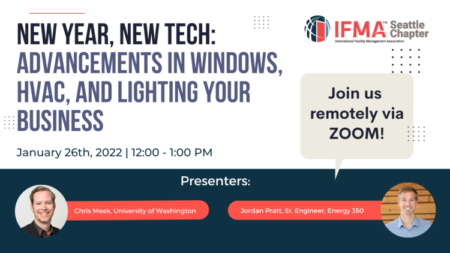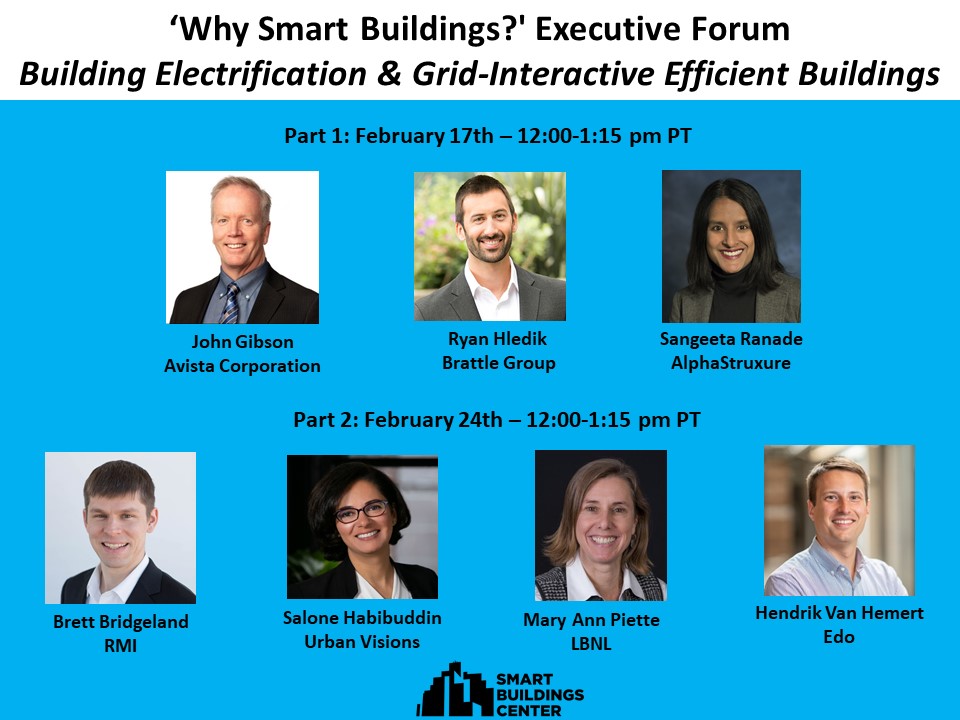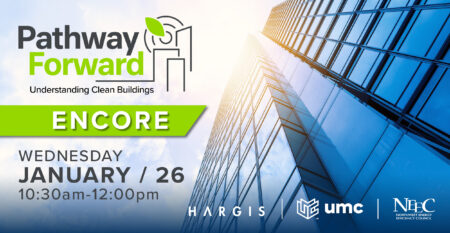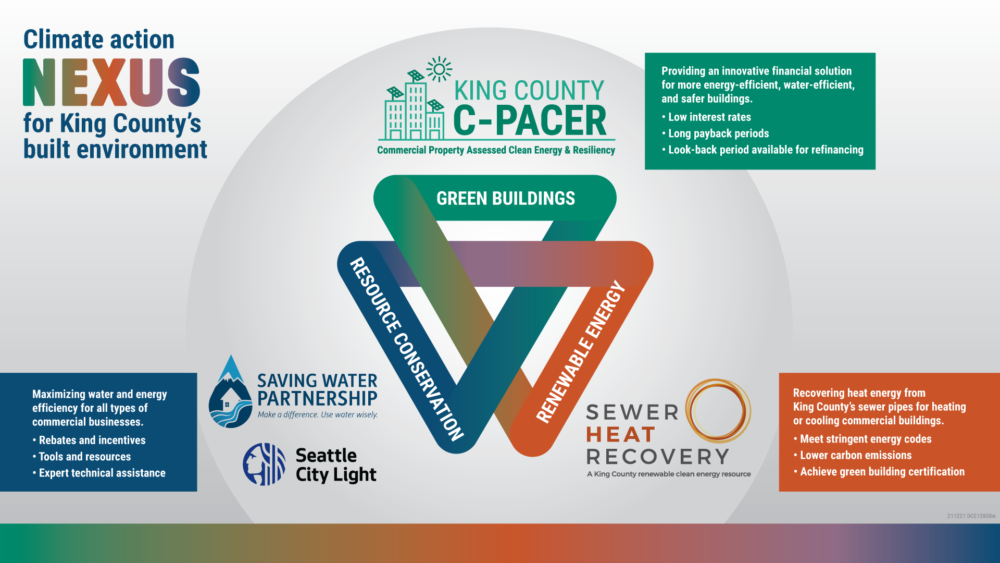BetterBricks and IFMA invite you to learn about the latest advancements in windows, HVAC and lighting that can improve your building’s health and safety, and occupant comfort and wellness, while delivering significant savings on your energy bills. Our systems experts will present on recent research and pilot findings for a variety of technologies and solutions, including secondary windows, HVAC systems and design best practices, and Luminaire Level Lighting Controls.
‘Why Smart Buildings?’ Executive Forum
Building Electrification & Grid-Interactive Efficient Buildings
Thursday, February 17th & 24th
12:00 – 1:15 pm PT
Register Here!
Certainly, increasing building electrification (BE) is a critical step toward decarbonization of the built environment. The specific steps to achieve BE are somewhat less certain. Replacing carbon-emitting fossil fuel appliances with clean electric sources is the easy answer, but as usual there are lots of complexities in making this happen in both commercial and residential buildings – new and existing. During the Smart Buildings Exchange (SBX) 2021 virtual conference, two technical sessions on grid-interactive efficient buildings (GEBs) highlighted the potential values of deploying dynamic two-way communication capacity in buildings to both the electric utility system and building owners and managers. This two-way communication can automate load shifting, shedding, and modulating and improve a utility’s capacity, resiliency, and cost. Building on the SBX 2021 conversations, this two-part Executive Forum discussion will link the efforts around BE to successful widespread deployment of GEBs.
Part 1 of this series will bring together expertise from the policy, regulatory, ratemaking, and utility industries to discuss their view on what must change from current practice to ignite a robust market for GEBs. Like most SBC events, this Executive Forum will be structured as an extemporaneous discussion between panelists (with a twist – see note on format below). Sure to be a dynamic and engaging discussion, this panel will tackle issues such as:
- Building electrification – the role that GEBs need to play to allow for optimizing utility capacity management/coincident peak management (the context being, can building electrification succeed without some form of GEBs)
- Grid modernization – everyone agrees that it needs to happen and that it will be expensive. Do GEBs offer a least cost approach to modernization that will enhance reliability/resilience?
- Are GEBs a complement to the Northwest’s emerging energy imbalance market – are the two compatible?
- Why aren’t GEBs evaluated as a resource in the 8th Power Plan?
- Are GEBs more realistic/helpful to the utility system in the residential or the C/I sector?
- What scale is necessary for GEBs to be a real solution?
- What rate reforms are needed to make GEBs work?
- What policy/regulatory reforms are needed to make GEBs work?
Part 2 of this series will feature a panel drawn from the communities of building owner/manager, developer, service provider and research institutions to discuss the market side of this equation. Of course, there has to be a market-based value proposition for the BE-GEBs solution to decarbonization and this group will take that question head-on. Again, expect a dynamic conversation amongst the panel addressing core issues, such as:
- Who is responsible for triggering market adoption – utility-customer-third party-government/regulator?
- Will dynamic rate structures be sufficient to move the market or are some types of financial incentives also needed?
- Are GEBs only realistic for new construction?
- If the future of commercial buildings is variable occupancy does this help or hurt GEBs deployment?
- How critical is the inevitability of EV charging to GEBs?
This FREE two-part virtual series is targeted to building owners/managers, developers, utilities, service providers as well as those with interest in or responsibilities for policy and regulatory changes related to decarbonization.
Ever been frustrated that your question didn’t get addressed by a panel because they ran out of time? Submit your questions ahead of time during registration and we will tailor the conversation to match your information needs!
Register Here!
Strategic Energy Management in Higher Education Facilities: COVID and Beyond
January 26, 2022
1-2 pm PT
REGISTER
Smart Buildings Center is excited to announce the next event in our ongoing series of Commercial Strategic Energy Management (CSEM) webinars, produced in partnership with Puget Sound Energy.
In this interactive webinar, panelists with expertise in strategic energy management (SEM) in higher education facilities will discuss their lessons learned in navigating the challenges of operating their buildings safely during the COVID-19 pandemic. They’ll also share insights for moving forward with a re-focus on energy efficiency, in light of the challenges presented by climate change and resulting mandates such as the WA Clean Buildings Performance Standard (H.B. 1257).
Register in advance for this webinar. After registering, you will receive a confirmation email containing information about joining the webinar.
Understanding the WA Clean Buildings Standard
The Clean Buildings Standard is one measure Washington State is taking to improve building operational efficiency. Propelling buildings to targeted energy use intensity by building type and size, all commercial buildings over 50,000 sf will need to comply by 2028 (220,000 sf by 2026), and then maintain compliance or be subject to penalties.
UMC, Hargis Engineers, and the Northwest Energy Efficiency Council (NEEC) have joined forces to break down the Clean Buildings Standard’s options and implications so you can define a path forward that aligns with your portfolio. [AIA CEU HSW 1.5 Credit]
Webinar: Meeting Water & Energy-Saving Goals in King County
Sustainable Energy Solutions & Innovative Financing Options
January 25, 2022
10:00 – 11:00 AM PT
REGISTER
Webinar speakers and topics will include:
Morgan Torres, Executive Climate and Energy Program Manager – Office of the King County Executive
King County will share its new innovative financing program, C-PACER, explaining how it can be used to invest in efficiency and resiliency measures to make buildings safer, more efficient, and less expensive to operate.
Natasha Bailey, Commercial Water Conservation Program Manager – Saving Water Partnership
The Saving Water Partnership is an organization comprised of 19 water utilities in King and Snohomish counties. We offer tips, tools, and rebates to help people preserve our region’s water for future generations.
Erika Kinno, Resource Recovery Research & Policy Project Manager – King County Wastewater Treatment Division
King County makes its sewer pipes available to private commercial property owners to use as a heat energy source for buildings. Sewer heat recovery can help lower energy costs, save water, and boost renewable energy use. The C-PACER program and Saving Water Partnership rebates are great opportunities that could support the use of this technology.
Upcoming Lighting Design Lab Courses
Commercial HPWH: Engineering Deep Dive Part 1
Tue, Jan 11 | 10am-noon | FREE
DAY 1 of 2. This course provides a foundation for implementing commercial heat pump water heater systems in multifamily settings.
REGISTER
Commercial HPWH: Engineering Deep Dive Part 2
Tue, Jan 18 | 10am-noon | FREE
DAY 2 of 2. This course provides a foundation for implementing commercial heat pump water heater systems in multifamily settings.
REGISTER
Tools for Modeling the 2018 SEC and WSEC
Thu, Jan 20 | 10am-11:30am | FREE
This course highlights the energy modeling requirements for Seattle and Washington State 2018 energy code compliance as well as ASHRAE 90.1 Appendix G – the new modeling standard.
REGISTER
Commercial HPWH: Design, Operations & Maintenance Deep Dive Part 1
Tue, Jan 25 | 10am-noon | FREE
DAY 1 of 4. Energy efficient commercial HPWH systems for the multifamily and commercial sector are gaining traction. This session dives deep into the science, technology, design and implementation of successful CHPWH systems.
REGISTER
Commercial HPWH: Design, Operations & Maintenance Deep Dive Part 2
Tue, Feb 01 | 10am-noon | FREE
DAY 2 of 4. Energy efficient commercial HPWH systems for the multifamily and commercial sector are gaining traction. This session dives deep into the science, technology, design and implementation of successful CHPWH systems.
REGISTER
Commercial HPWH: Design, Operations & Maintenance Deep Dive Part 3
Tue, Feb 08 | 10am-noon | FREE
DAY 3 of 4. Energy efficient commercial HPWH systems for the multifamily and commercial sector are gaining traction. This session dives deep into the science, technology, design and implementation of successful CHPWH systems.
REGISTER
Commercial HPWH: Design, Operations & Maintenance Deep Dive Part 4
Tue, Feb 15 | 10am-noon | FREE
DAY 4 of 4. Energy efficient commercial HPWH systems for the multifamily and commercial sector are gaining traction. This session dives deep into the science, technology, design and implementation of successful CHPWH systems.
REGISTER
Introduction to Central Systems for Heat Pump Water Heating (Part 1): The Whys and Hows of Heat Pump Water Heater Systems for Multifamily and Commercial Applications
Tue, Feb 22 | 10am-11am | FREE
DAY 1 of 2. This course will explore the policy drivers that are pushing the integration of central heat pump water heating systems and highlight the economic, energy, and environmental advantages of heat pump water heater systems for commercial and multifamily projects. It will also discuss successful projects and case studies, while outlining which applications have the best opportunities for success.
REGISTER
Introduction to Central Systems for Heat Pump Water Heating (Part 2): How to Select and Design a Heat Pump Water Heater System in Your Next Multifamily or Commercial Project
Tue, Mar 01 | 10am-11am | FREE
DAY 2 of 2. This course provides an overview of key central system design considerations. It explores the different system components, including next generation refrigerants, and gives an update on the status and evolution of available plug-n-play commercial equipment. Lastly, it walks through the Ecosizer tool available to properly size central heat pump systems.
REGISTER




